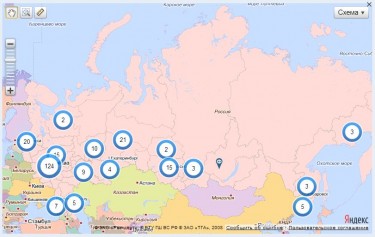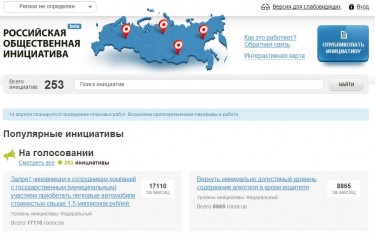Last month RuNet Echo reported [GV] on a proposed Russian government online petition platform, similar to “We the People“, a White House-run project in the US, where after reaching a certain amount of signatures a petition would be addressed by the government. On April 2, 2013, the project, called Russian Public Initiative [ru], went live. Here, RuNet Echo takes a look at how it works in practice, and what manner of initiatives it has attracted 10 days on.
Russian Public Initiative explains exactly how it works in a handy “How this works” [ru] flow-chart. First, in order to launch a petition one needs to register at www.gosuslugi.ru [ru], the Russian e-government portal. Then, after picking the level of initiative (“federal”, “regional”, or “municipal”), the initiative goes to the “legal examination” stage, after which point it is either released for voting or binned. The geographic level matters in terms of signatures required for the initiative to be submitted to a legislative body. While all three types of initiatives get a year to collect signatures, a “federal” level initiative needs 100,000 signatures, in contrast to the “municipal” and “regional” kinds, which both need to collect the signatures of 5% of the relevant populations.

Map from roi.ru website, showing the geographical distribution of petition originators. Screenshot, April 13, 2013.
How are the initiatives doing so far? First, a quick numerical breakdown. There are currently 252 “initiatives”, or petitions, on the site. Of these, so far 126 have over 100 signatures, 18 have over 1,000 signatures, 5 have over 5,000, and only one has broken the 10,000 signature barrier. All petitions with over 1,000 signatures are at the “federal” level. Only 10 of the 252 are at the municipal level, and 25 are regional. Of the 25 “regional” petitions, 19 address issues in either Moscow or the Moscow Region, however, no municipal level petitions are from Moscow.
What are some of the popular initiatives? The clear leader [ru], with 16,978 signatures, is a petition to ban bureaucrats and employees of state-or-municipal-affiliated companies from purchasing cars worth over 1.5 million rubles (48,000 USD). This initiative, launched on April 5 by anti-corruption activist, blogger, and unofficial opposition leader Alexey Navalny, is very well put together — it describes the problem, gives examples of such purchases from zakupki.gov.ru, the Russian government tendering website, and even attaches a Microsoft Word document containing the text of the potential bill. Navalny also claims [ru] to be monitoring the voting process with a “script” in order to see if there are any suspicious “drops” in the numbers. With almost an entire year to go, and as the website receives more attention, this petition seems certain to make it past the 100,000 signature requirement.
Another popular initiative [ru] is the repeal of zero-tolerance laws aimed at drunk driving. (Currently Russian law prohibits driving with any amount of blood-alcohol content, i.e. there is no minimum legally “safe” level. Many argue that this opens up avenues for police corruption, making it possible to charge anyone with drunk driving, since even drinking yogurt would raise BAC over 0.0.) In contrast to the above initiative, this one, with 8,818 signatures, is rather short and low on details. This is its entire text:
Нужно вернуть допустимый промилле, потому что проблем от этого «сухого» закона больше, чем достоинств. Получается, скоро нельзя будет управлять автомобилем по состоянию здоровья, потому что организм вырабатывает чуть больше алкоголя, чем положено. Или вводить в ПДД ограничения на продукты, которые нельзя употреблять, если ты водитель.
We should return a minimum BAC level, because there are more problems than benefits from this “dry” law. Soon it'll turn out that you won't be able to drive a car because of health reasons, because your body produces a bit more alcohol than usual. Or the driving regulations should include restrictions on foods that you can't eat if you are a driver.
The most popular regional initiative, with 189 signatures, is simply to make the Moscow metro run 24 hours per day [ru]. The most popular municipal initiative [ru], with 119 supporters, gets into the fine-print of utility provision and metering in the regional city of Yekaterinburg.
Initiatives are further categorized according to the nature of the problem they are meant to address. Unfortunately a single petition can belong to multiple categories, which makes any sort of analysis questionable without access to raw data. Nevertheless, one can observe the categories that are most and least popular. The five most popular categories are “Transport and roads” with 67 initiatives, “Population and migration” with 37, “Security” with 36, “Bureaucracy” with 36, and “Urban Infrastructure” with 28. The five least popular are “Education and Science” with 13, “Housing and Utilities” with 12, “Criminal Code” with 10, “Government Support” with 6, and “Electoral Rights” with 3. It is of course impossible to judge what drives this popularity, the actual number of submissions or the pre-moderation “legal review” process.
Judging by some of the initiatives, however, the review process is not particularly strict. For example, there is the initiative to give every Russian citizen a “virtual” million rubles [ru]. Or to bring back [ru] the “Nationality” line to the Russian passport (a hated part of Soviet history). Some are concerned with the disappearance of dandelions [ru] in the Moscow Region and want to legislate their protection. Others want to ban bureaucrats from requiring photocopies [ru] of documents. And of course there are the requisite “Bury Lenin” [ru] and “Teach Children Atheism” [ru] proposals. Last but not least, there is this [ru] epitome of RuNet wisdom:
Нужно установить веб-камеры в кабинетах чиновников с выводом изображения в интернет.
We should put web-cams in the offices of bureaucrats with their picture displayed on the internet.
If this proposal ever makes it to the final stage (unlikely as it is) we shall know for sure the process is legitimate.









6 comments